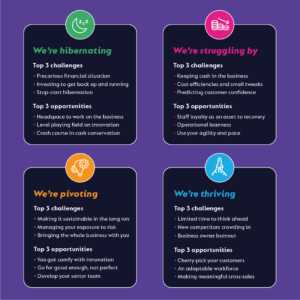Leadership & Strategy
Article
Hibernating SMEs work out how to get going again
 So you’re a hibernating SME. Not as cosy as it sounds is it?
So you’re a hibernating SME. Not as cosy as it sounds is it?
You’re one of the thousands of businesses that temporarily closed their doors and furloughed most staff.
You’ve been dormant because you could see no way to remain open while protecting the health of your customers and employees – and no other way of staying solvent.
Some 28 per cent of SMEs are hibernating
According to our recent survey, 28 per cent of SMEs classify as “hibernating”. While this group includes firms in a wide range of situations, most hibernators are reliant on a physical presence to deliver core products and services, like restaurants, high street retailers, hotels and hair salons.
Hibernators are now stuck between not quite knowing what to expect while also having to plan and invest in the future. You are also faced with the prospect of taking on additional cost before you see any significant revenue returns.
We’ve spoken to other business owners who identified themselves as Hibernators to find out what they’re focusing on in the short-term and how they view the future. And in the light of lost business, how can they even think about bouncing back? Here are the key challenges and opportunities your fellow Hibernators have identified:
Challenges for hibernating SMEs
- Precarious financial situation. Your cash position gave you little room to manoeuvre so you’ve been navigating government support in the shape of loans, deferments or industry-specific grants. As furlough support is phased out, you’ll be treading a tricky line around solvency.
- Investing to get back up and running. The cost and practicality of adapting your premises and processes to social distancing requirements is a concern. You’ll be looking for practical ideas on how to open up your business and bring staff and customers confidently back on site.
- Stop-start hibernation. If coronavirus infection rates fluctuate over the next 12-18 months, lockdown might ebb and flow regionally. You could be moving in and out of hibernation for short periods, draining your cash as you staff up, stock up and open up for only-patchy footfall.
Opportunities for hibernating SMEs
- Working on the business not in the business. Although most business owners under lockdown have hardly been twiddling their thumbs, many have managed to get a little headspace. This has led some out of hibernation and into direct-to-consumer pivots and click-and-collect orders from restaurants.
- Level playing field on innovation. Startups and high-tech firms are often credited with all the innovation chops but this crisis has seen businesses from all sectors accelerate technology plans, such as website refreshes, e-commerce platforms, cashless payment or touchless check-in for hotels.
- Crash course in cash conservation. Whether it’s with employees, suppliers, customers, landlords or banks, the owners of hibernating businesses have been forced to look for novel ways to keep cash in the business. United by a common goal – survival – you explore new terms or incentives and new ways to offer value.
What’s next for for hibernating SMEs?
There’s a lot of talk about bouncing back, but for some businesses, recovery isn’t going to be feel much like “bouncing”. Some Hibernators may not emerge at all. Some will emerge and aim to work a way back to recognisable normality And some will emerge quite different from before, more resilient for the way each have tackled the challenges of hibernation.
While research tends to suggest clear-cut segment, in reality the lines between Hibernators, Strugglers and Pivoters are not static. Even today’s Thrivers might find themselves in a very different place tomorrow with changing guidance from government and the unpredictability of lockdown. Over the next 12 months you might move in and out of these definitions as we all regroup and figure out what the future holds. (Eventually let’s hope you’ll all be thriving.)
As you work through your own rebuild puzzle, here are the phases you might go through:
Hibernator stories
Pall Mall Barbers
Pall Mall Barbers has eight shops, seven in the UK and one in New York. Its revenue dropped through the floor in a matter of weeks, and as a non-essential business, had to close its doors.
Typical of most hibernators, MD Richard Marshall has been hard at work negotiating to keep the business solvent. In close discussion with the landlords of his company’s eight sites to find out what they can do to help, he’s relying on the landlords to think longer term about how to keep his loyalty and offer rent forbearance until his revenue picks up again. “Everyone needs a haircut. Everyone wants to look good. The reality is, we have a viable business, we were trading well before, and we have to consider how long it’s going to take to get us back to that point.”
The same goes for Richard’s efforts with the bank. He’s been trying to take advantage of any help they can offer to make sure his business is able to go the distance amid a rising pile of fixed costs. He wants his current difficulty to be seen for what it is – essentially a bump in the road: “We were trading as normal and then we were trading at 80 per cent, then 20 per cent and finally zero per cent within a couple of weeks.”
Listen to our our full interview with Richard
Bluebell Fitted Furniture
Having been in business for 29 years, Mike and Alison Reuben thought the global recession in 2008 was going to be the worst of it. They never expected it to be a mere dress rehearsal for the stresses and strains their business is now going through. During the first week they furloughed all employees, except for one of their accountants. They next contacted suppliers, asking if accounts could be frozen. Having received a fairly positive response, they also spoke with the bank about switching all loans to interest only for six months.
Mike advocates the importance of not burying your head in the sand and keeping cash flow projections up to date. Being proactive and meeting your obligations head on will help your business bounce back. He also mentions the importance of using this down time to work on your business – tackling everything you’ve put off when times were busy. Bluebell Fitted Furniture are working on marketing – focusing on digital while people are spending more time online.
Watch Mike discuss how he made some big early decisions
Kendal Hostel
Kendal Hostel in Cumbria is, like most hospitality businesses, hibernating. However joint owner Kristina Rowe is busy thinking about how best to protect and prepare her 14-room, 67-bed hostel. Closed since March 24, Kristina has secured a £10,000 government cash grant available to small businesses.
She’s also reduced business overheads – but the next move is unsure. Kristina is exploring self-check in options and repurposing of large dormitories for family use. Plans are difficult with so many unknowns, such as the prospect of having to keep rooms empty for two days between guests: “That would affect our profits quite a bit” added Kristina. She also has the problem of how to cater for social distancing in shared facilities such as kitchen and living rooms. “We’ve been looking at the idea of timed entries for people to go into these rooms, although that would be tricky – and we don’t even know yet if it would be required or the right thing to do.”
In anticipation of a possible start to training in summer, Kristina’s been making improvements to the website. Demand is hard to predict though. “I think a lot more people are going to be looking to stay in this country,” she commented. “I think people are finding new ways to explore what’s around them and asking, ‘Are there things we can do here that we don’t need to go abroad for?’. And hopefully, that will be a good thing for us.”
Read our full interview with Kristina
